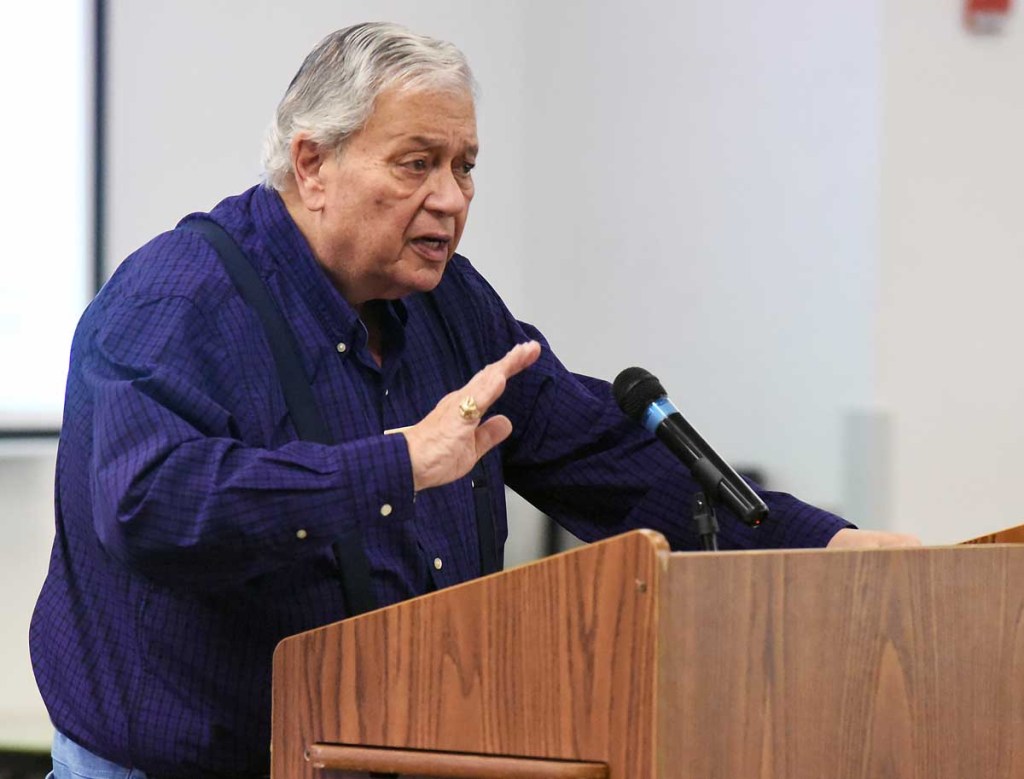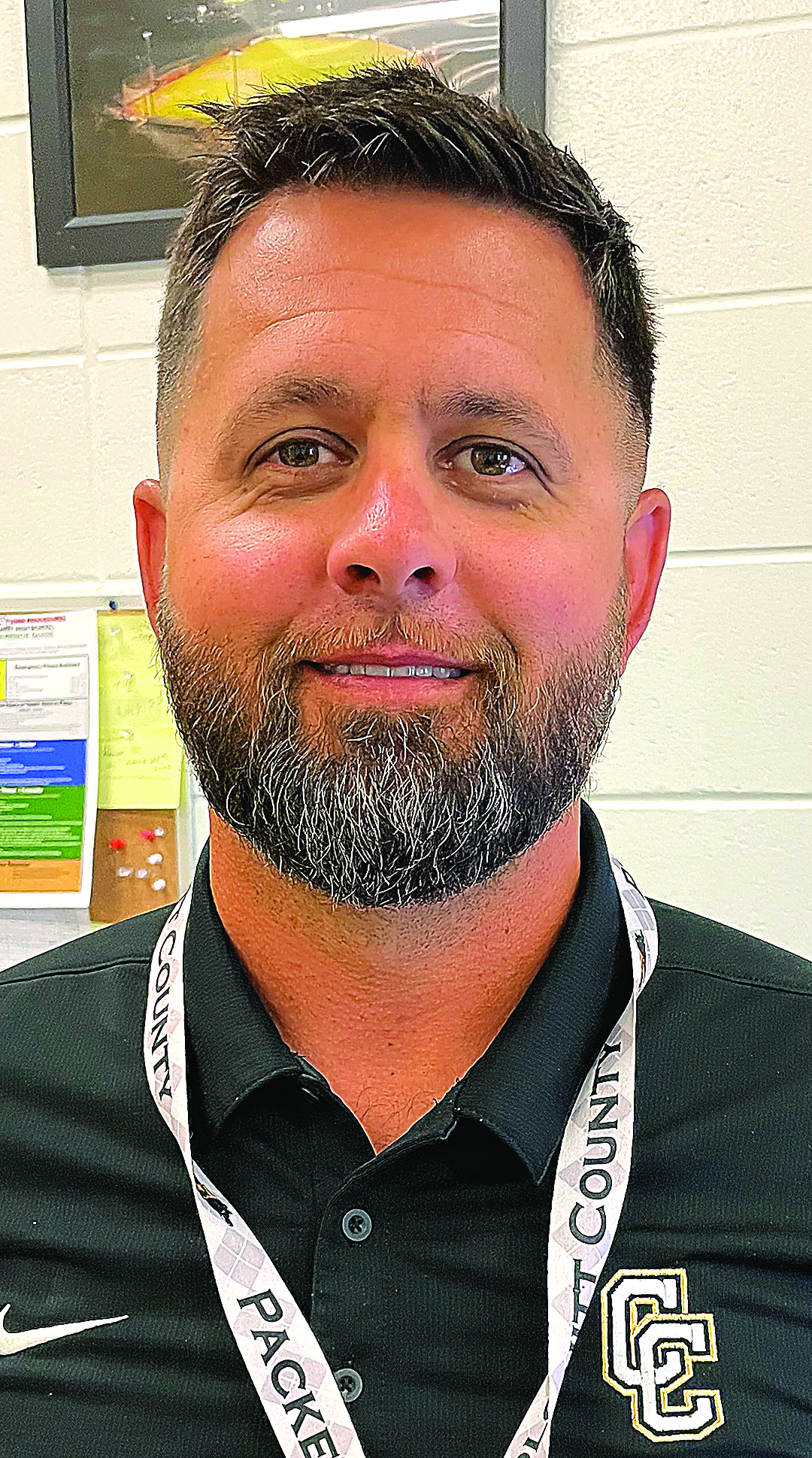Holocaust survivor says he’s lucky, tells students to never stop learning
Published 1:07 pm Monday, February 26, 2018

- George Rishfeld, who lives in Atlanta, speaks about his experiences surviving during the time of the Holocaust on Friday at Dalton Middle School.
DALTON, Ga. — George Rishfeld was just a baby in Warsaw, Poland, when Germany invaded the country at the beginning of World War II and launched the genocide now known as the Holocaust, and he said he’s a lucky man to be able to talk about his experiences so many years later.
“I believed I was saved so I could go on to tell the story, because it has to be told. There are people out there who don’t believe it happened,” Rishfeld said to students at Dalton Middle School on Friday.
Trending
While Rishfeld was too young, just six months old, to remember the Nazi army taking control of Warsaw and transforming it into what is said to be the largest of the Jewish ghettos in Europe during the war, he survived because his parents — Richard Rishfeld and Lucy Trainowitz Rishfeld — were able to help him escape with the aid of family friends in Lithuania. His earliest memories were of living with the people who took him in and hid him for the duration of the war, and of several close calls with Nazi soldiers hunting Jewish men, women and children.
“I’m told they threw me over a barbed-wire fence,” Rishfeld said of his escape from Warsaw.
While his father later escaped the ghetto and joined a Polish resistance group referred to as the Partisans, his mother was put to work sewing clothing for the Nazis, a job that at least allowed her to wear clothing, work inside and be fed meager rations of bread and water while thousands of Jews in the ghetto were left naked outside in the snow to die of starvation. More than 400,000 people were imprisoned in Warsaw, and many were either shot to death, forced into gas chambers or died of rampant hunger and hunger-related diseases, according to reports.
Rishfeld’s parents survived the Holocaust, and the family was reunited after the war. They eventually moved to New York City, where Rishfeld went on to learn English, graduate high school at 17, join the U.S. Army and then attend college. But his family was not without loss.
He told students how his aunt was walking down a street in the Warsaw ghetto with her infant in her arms. After refusing the advances of a Nazi officer, she and her baby were shot dead and their bodies left in the street. He said his grandparents were led to a mass grave, shot and killed, and their bodies buried along with hundreds of others.
“I’m ashamed to say this, but I had it pretty good. There were kids being killed everywhere, and I was safe,” he said.
Trending
Rishfeld said he was lucky because he had a roof over his head, food in his belly and, most importantly, two loving people taking care of him in the absence of his family. He said he was also lucky because there were at least three times he remembered nearly being captured by the Nazis.
The first time he was out walking with Helena, the woman he was living with, when a Nazi officer approached them and asked where the boy’s mother was. Being a child and not yet knowing better, Rishfeld told the Nazi his mother was in the ghetto. Luckily, the soldier misunderstood and thought Rishfeld had said she was in the mud, implying she was dead, so the Nazi laughed, pinched the child’s cheek and gave him an apple.
Rishfeld also told the students about the time Nazis searched the apartment he was living in. He hid under a bed with only a blanket blocking him from view. He said he could hear footsteps in the room, and then suddenly a blade stabbed though the bed and barely grazed his chin before hitting the floor.
“If that Nazi hadn’t been lazy and he had just picked up that blanket then I wouldn’t be here talking to you,” Rishfeld said.
The third close call came when he and Helena were in a church service (the family he was staying with was Catholic) and she suddenly told him to fake a stomach ache and to cry if he could manage it. He thought it was a game and played along, so Helena rushed him from the church just as Nazis entered. They ignored the lady with the crying child as the two quickly left.
After the war ended, his parents — who had not had any contact for years and assumed the other was dead — had a chance reunion while they were separately en route to get hm in Lithuania. His mother, sickly and dirty after just being liberated from the ghetto, was waiting for a train when she saw a familiar-looking man in a dapper Russian military uniform. At the same moment, his father recognized her, too.
“My mother told me this story a hundred times if she told me once,” Rishfeld said, explaining that the couple embraced. “And my mother hauled back and smacked my father’s face and said, ‘How dare you smell so good!'”
Rishfeld said there aren’t words to describe the moment both of his parents appeared on the doorstop where he lived, only that it was a hugely emotional moment followed by several hours of tears of joy.
Rishfeld told the students that despite years of nightmares in which he would see that Nazi blade coming toward his face and feel that Nazi pinching his cheek, he knows he was one of the lucky ones to survive and to still have both of his parents when the war was over. He advised the children to always be positive, to always listen to others and consider their viewpoints without judgment, and to always keep learning.
“Here’s my advice: Learn. Learn. Learn. Learn. Read. Read. Read. Read. You are nothing without an education. Think for yourself and educate yourself,” Rishfeld said. “It doesn’t matter if you’re black, blue, green or yellow, you’re all individuals.”
Rishfeld and his wife, Pamela, live in Atlanta. They have two daughters and six grandchildren. His talk was presented by the Georgia Commission on the Holocaust (www.holocaust.georgia.gov), described as a “secular, nonpartisan” state agency, along with Dalton Middle School.





